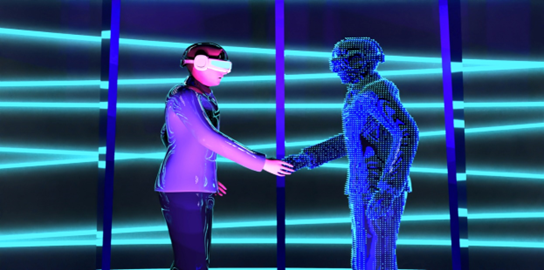AI has the potential to revolutionize the healthcare industry. As technology advances, AI has become increasingly relevant in the healthcare industry, enabling healthcare providers to make faster, more accurate decisions and improve patient outcomes. In this article, we’ll explore how AI is transforming the healthcare industry and the potential benefits of AI-driven healthcare.
Introduction to AI and the Healthcare Industry
AI, or artificial intelligence, has been around for decades, but it is only recently that its potential applications in the healthcare industry have been fully realized. AI is a form of computer science that enables machines to learn from their environment and make decisions based on their observations. AI can be applied to a variety of healthcare tasks, from diagnosing diseases to analyzing medical images and predicting patient outcomes.
In the healthcare industry, AI is being used in a variety of ways. It has the potential to transform the way healthcare is delivered and to improve patient outcomes. AI can be used to automate tasks, reduce errors, and improve accuracy. It can also be used to analyze enormous amounts of data to help healthcare providers better understand a patient’s condition and make more informed decisions.
The healthcare industry is also increasingly turning to AI to improve efficiency and reduce costs. AI-driven technologies can help automate processes, freeing up healthcare providers’ time to focus on patient care. AI can also be used to analyze patient data to help healthcare providers understand a patient’s condition and make more informed decisions.

Examples of AI in Healthcare
AI is being used in a variety of ways in the healthcare industry. Here are a few examples of how AI is being used in healthcare:
- Diagnosis and treatment: AI can be used to analyze substantial amounts of data and make more accurate diagnoses, allowing healthcare providers to make more informed decisions.
- Imaging and analysis: AI can be used to analyze medical images and detect abnormalities, allowing healthcare providers to make more informed decisions.
- Automation: AI can be used to automate tasks such as scheduling appointments, ordering supplies, and submitting insurance claims, freeing up healthcare providers’ time to focus on patient care.
- Predictive analytics: AI can be used to analyze patient data and predict potential future outcomes, allowing healthcare providers to make more informed decisions.
As a real-world example of AI applications, AI is assisting radiologists in reading pictures more quickly and precisely.
Similarly, AI can assist with picture segmentation and quantification in radiology, allowing radiologists to focus on higher-level image interpretation. AI may also serve as a second pair of eyes, assisting radiologists with their decision-making by pointing out areas of interest or incidental findings that they may have missed.
AI algorithms that examine MR pictures of the brain for subtle neurological changes over time, for example, have been demonstrated to enhance diagnosis accuracy in multiple sclerosis patients by 44% while decreasing reading times. Similarly, AI-based lung nodule identification can complete nodule searches 26% quicker and find 29% of previously overlooked nodules when compared to traditional methods.
Challenges to Adopting AI in Healthcare
While AI has a great benefit for the healthcare industry, there are still challenges to adopting AI in healthcare. Here are some of the challenges to adopting AI in healthcare:
- Cost: AI-driven technologies can be expensive to implement, and healthcare providers may not have the resources to invest in these technologies.
- Complexity: AI-driven technologies can be complex and difficult to understand, making them difficult to implement and use.
- Security: AI-driven technologies can be vulnerable to security risks, making it important for healthcare providers to ensure that their systems are secure.
- Privacy: AI-driven technologies can be used to collect and store large amounts of patient data, making it important for healthcare providers to ensure that patient data is protected.
- Regulatory: AI-driven technologies may be subject to stringent regulations, making it important for healthcare providers to ensure that their systems comply with these regulations.
The Role of the Metaverse in AI-Driven Healthcare
The metaverse is a virtual world where people can interact with each other and access information in a virtual environment. The metaverse has the potential to revolutionize the healthcare industry by improving access to care and enabling healthcare providers to make more informed decisions.
The metaverse is being used in a variety of ways in the healthcare industry, from virtual clinics and virtual consultations to virtual health records and virtual drug development. The metaverse can also be used to help in medical education for healthcare practitioners, allowing healthcare providers to easily upskill and reskill their staff through a virtual medium.

Final Thoughts and Conclusion
AI can bring value by automating or supplementing physicians’ and staff’s job. Many monotonous activities will be totally automated, and AI will assist health professionals in doing better at their professions and improving patient outcomes. AI in healthcare has several advantages, including the ability to automate processes and analyze large patient data sets to offer better treatment sooner and at a cheaper cost. According to Insider Intelligence, administrative duties account for 30% of healthcare expenditures. AI will have a huge influence on providing more efficiencies and breakthroughs than we can now fathom in finding more efficient methods to update our healthcare ecosystems.
At VCL, we understand the importance of AI in the healthcare industry. We are committed to helping organizations adopt a new AI strategy and leverage the potential of AI to improve patient outcomes.
To know more about how VCL can help your organization in adapting a new AI strategy, contact us today.



